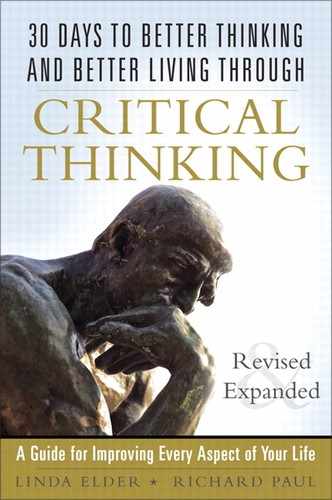Book Description
Better critical thinking can transform your life and help you improve every decision you make! Now, in just 30 days, master specific, easy-to-learn critical thinking techniques that help you cut through lies, gain insight, and make smarter choices in every area of your life -- from work and money to intimate relationships. World-renowned critical thinking experts Dr. Linda Elder and Dr. Richard Paul show how to overcome poor thinking habits caused by self-delusion or out-of-control emotions... clarify what you really want... recognize what you don’t know… ask better questions... resist brainwashing, manipulation, and hypocrisy... critically evaluate what you’re told by advertisers, politicians, your boss, and even your family… avoid worrying, conformism, and blame. Every day, you'll focus on a specific thinking habit, mastering practical strategies for achieving results, tracking your progress, gaining confidence, and getting smarter! Expanded, improved, and easier to use, Discover the Power of Critical Thinking, Revised and Expanded edition offers today's most complete, practical plan for using critical thinking to build a better life. This edition adds five new "days" of critical thinking workouts, delivering even more powerful "life improvement" ideas. Brand-new illustrations and diagrams help you see the direct relevance of critical thinking in your own life, and you'll find a practical new introduction to the authors' Paul-Elder Framework for Critical Thinking, which is now being used by critical thinkers worldwide!
Table of Contents
- Title Page
- Copyright Page
- More on What People Say About the 30 Days Book...
- Dedication Page
- Contents
- Introduction
- Improve Your Thinking, Improve Your Life
- Can Your Thinking Be Your Problem?
- A How-To List for Dysfunctional Living
- Take Your Thinking Seriously
- No Intellectual Pain, No Intellectual Gain
- The Concepts, Principles, and Tools of Critical Thinking
- Why Critical Thinking?
- The Figuring Mind
- Analyze Your Thinking (Focusing on the Elements of Reasoning)
- Assess Your Thinking (Using Reasonable Standards)
- Systematically Apply Intellectual Standards to the Elements of Reasoning to Develop Intellectual Traits
- Pursue the Constellation of Intellectual Traits
- Understand the Mind’s Three Distinctive Functions
- Recognize Thinking as the Key to Feelings and Desires
- Distinguish Rational from Egocentric and Sociocentric Thoughts
- Understand Egocentric Thinking as a Problem
- Distinguish Egocentric Domination from Egocentric Submission
- Understand Sociocentric Thinking as a Problem
- A Substantive Approach to Critical Thinking Targets
- The Thirty-Day Plan
- Tips for Internalizing Each Idea
- Planning and Logging Your Progress
- Day One. Discover Your Ignorance
- Day Two. Strive to Be a Person of Integrity: Beware of Your Own Hypocrisy
- Day Three. Empathize with Others
- Day Four. Deliberately Target Your Purposes
- Day Five. Don’t Be a Conformist: Think for Yourself
- Day Six. Clarify Your Thinking
- Day Seven. Be Relevant: Stick to the Point
- Day Eight. Be Reasonable
- Day Nine. Ask Deep Questions
- Day Ten. Distinguish Among Questions of Fact, Preference, and Judgment
- Day Eleven. Think Through Implications
- Day Twelve. Distinguish Inferences from Assumptions
- Day Thirteen. Don’t Be Fooled by the Words People Use: Look Underneath Words to Unspoken Realities
- Day Fourteen. When You Think You Have Arrived as a Critical Thinker, Think Again
- Day Fifteen. Be Fair, Not Selfish
- Day Sixteen. Get Control of Your Emotions
- Day Seventeen. Take Control of Your Desires
- Day Eighteen. Don’t Dominate Others: Don’t Be a Top Dog
- Day Nineteen. Don’t Be Submissive; Don’t Be an Underdog
- Day Twenty. Don’t Be Brainwashed by the News Media
- Day Twenty-One. Carefully Choose the Ideas You Take in from Television, Ads, Movies, and the Internet
- Day Twenty-Two. Don’t Be Bamboozled by Politicians
- Day Twenty-Three. Don’t Be a Blamer
- Day Twenty-Four. Don’t Be Righteous: Show Mercy
- Day Twenty-Five. Vow to Spend No Time Worrying
- Day Twenty-Six. Be a Citizen of the World
- Day Twenty-Seven. Do Something, Anything, to Help Make the World Better
- Day Twenty-Eight. See Your Development Occurring in Stages
- Day Twenty-Nine. Educate Yourself
- Day Thirty. Figure Out Where to Go from Here
- Reading Backwards
- Recommended Readings to Augment the Strategies
- Appendix. Glossary of Terms
- Index
- About the Authors
- FT Press
